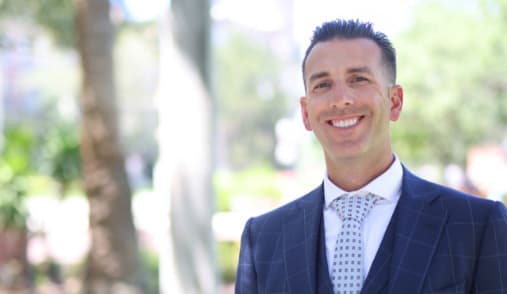DO YOU FALL IN ONE OF THESE TAMPA CAR CRASH CATEGORIES?
- Law enforcement gave you the ticket for the car accident and you were hurt in that car accident
- The insurance company determined you were at fault for the car crash and were hurt in that car crash
IF EITHER OF THESE SCENARIOS IS YOUR SITUATION, FRANCHI INJURY LAW WANTS TO TALK TO YOU AND TRY TO HELP YOU.
- Did you know that Florida law enforcement does not determine fault in a car accident?
- Did you know that Florida traffic crash reports are not generally admissible in court?
- Did you know that Florida is a comparative negligence state?
What is Comparative Fault?
Comparative fault is a legal concept and term which is a fancy way of saying each party is at fault by some percentage. Under this concept, a person can be 99% at fault for their injuries in a car crash, and still collect 1% of damages from the other driver.
This is likely more easily explained with a car accident example. This car crash example is the most common comparative negligence we generally see.
You are driving and come up to a four way stop. At the same time, the driver to your right comes to the same four way stop. You both stop and start to go through the intersection, thinking the other remained stopped at the stop sign. There are no other cars or witnesses around. You and the other driver get into a T-Bone style car crash in the middle of the intersection. Who is at fault?
The likely answer to this is that you each will be 50% at fault for the car accident.
This example can be used in many different scenarios with many different percentages of fault. This is why it is important to call a Tampa car accident attorney.
How Does Comparative Fault Impact My Medical Bills?
All of your damages, including the amount for medical bills will be reduced by the percentage of fault attributed to you. This means that if you were 50% at fault for the crash, your damages are reduced by 50%.
For example, if as a result of the car crash, you had $10,000 in medical bills, $5,000 in lost wages, and $10,000 in pain and suffering, your total damages from the car crash would be $25,000. In the 50% comparative fault scenario, your damages from the car accident would be $12,500. Typically, even when there is a 50% comparative fault scenario from the car crash, the plaintiff still recovers pain and suffering.
Who Determines Fault?
If law enforcement found you to be at fault on the scene of the car accident, but you know you were not 100% at fault, you most likely need a car crash lawyer from Franchi Law to help. Once Franchi Law is hired after a car crash with injuries, we start an investigation. This car accident investigation begins with a review from a car accident attorney. After that, the car crash lawyer will determine if a crash reconstruction expert is needed. A lot of cars on the road today have an event data recorder, which is similar to an airplane’s black box.
Your car crash attorney will determine if an expert is needed to gather the event data recorder information. All of this is necessary so that your car accident attorney has the evidence necessary to challenge the insurance company.
Since law enforcement doesn’t determine fault in a Tampa car accident, who does? The answer to this is either the insurance companies or a jury. The personal injury lawyers at Franchi Law are prepared to fight both.
Why doesn’t law enforcement determine fault? Most of the time, law enforcement does not witness these car accidents. As a former deputy, I can also attest to the fact that it is difficult to investigate a car accident thoroughly, while there are higher priority calls for service waiting, and you are being pressured to finish the “minor” car crash at hyper speed.
Since the insurance companies will be determining fault, they will treat you fairly, right? Wrong. It is imperative that you talk to a personal injury attorney about your car crash before talking to the insurance company. If you had been arrested, would you rather talk to the police with or without a lawyer? The answer to that should be with a lawyer. The insurance company is no different. They are not your good neighbor, and you are not in good hands. With a Riverview personal injury lawyer, you are in good hands.
Insurance Company Tactics in a 50/50 Fault Comparative Fault Accident
When it comes to car accidents where both drivers bear some responsibility, insurance companies often try to minimize their liability by shifting a higher percentage of fault onto the injured party. In cases that involve comparative fault, especially in states that follow pure comparative fault rules, a person can still recover damages even if they’re partially at fault. Here are some common tactics insurers may use to reduce their payouts and how a good lawyer can counteract these moves.
Assigning a Higher Percentage of Fault to You: In a 50/50 fault accident, the insurance company may argue that you’re more responsible for the incident than evidence shows. For example, they might claim you were speeding or not fully stopping at a stop sign, raising the degree of your own negligence.
How a Lawyer Can Help: An experienced personal injury lawyer can gather evidence—like witness statements, photos, or accident reconstruction reports—to argue for a fair percentage of fault. This ensures that you’re not unfairly held more responsible, which could affect your ability to recover damages.
Using Statements to Shift Blame: After a car accident, the insurance company might request a recorded statement, hoping the injured party will say something that shifts more liability their way. This can reduce the plaintiff’s compensation in a comparative fault case.
How a Lawyer Can Help: Your lawyer can guide you through statements, ensuring you avoid phrases that might imply higher liability. With professional assistance, you can prevent the insurance company from using your words to manipulate the percentage of fault.
Downplaying Injuries and Damages: In comparative negligence claims, insurance companies sometimes argue that the plaintiff’s injuries were less severe than claimed, aiming to reduce the total damages or argue that medical bills don’t reflect the injuries’ impact.
How a Lawyer Can Help: An attorney will compile detailed records of your medical bills, lost wages, and other damages, showing the true impact of the injury. This evidence supports your claim, ensuring the insurance company doesn’t undervalue your compensation.
Delaying Settlement Offers: Sometimes, insurers delay settling a personal injury case to push the plaintiff into accepting a lower offer, especially if financial pressure mounts due to medical costs or lost income from injuries.
How a Lawyer Can Help: A lawyer can press the insurance company to move the claim forward, holding them to deadlines and taking the case to court if necessary. This avoids unnecessary delays and ensures that you’re fairly compensated within a reasonable timeframe.
Offering Low Settlements in Pure Comparative Fault Cases: Under the pure comparative fault rule, plaintiffs can collect damages even if they’re partially at fault, but insurance companies may offer a lowball settlement early on, especially in a 50/50 fault situation, to discourage further legal action.
How a Lawyer Can Help: Your attorney will assess the offer compared to the total damages you’re entitled to, including any reductions based on your degree of responsibility. They can negotiate with the insurance company for a settlement that accurately reflects your claim, preventing an early settlement that falls short of covering your losses.
Different states follow various rules, such as pure contributory negligence, modified comparative negligence, or pure comparative negligence, and each affects a plaintiff’s ability to recover damages differently. If you’ve been involved in a car accident and believe the insurance company is trying to increase your liability unfairly, contacting a lawyer for a free consultation is the first step to protecting your rights and securing fair compensation.
When you have a comparative fault auto accident in Tampa, call Franchi Law. The consultation is free. Franchi Law is the Tampa and Riverview comparative fault personal injury firm with the Franchi Law promise. We will exceed your expectations.



